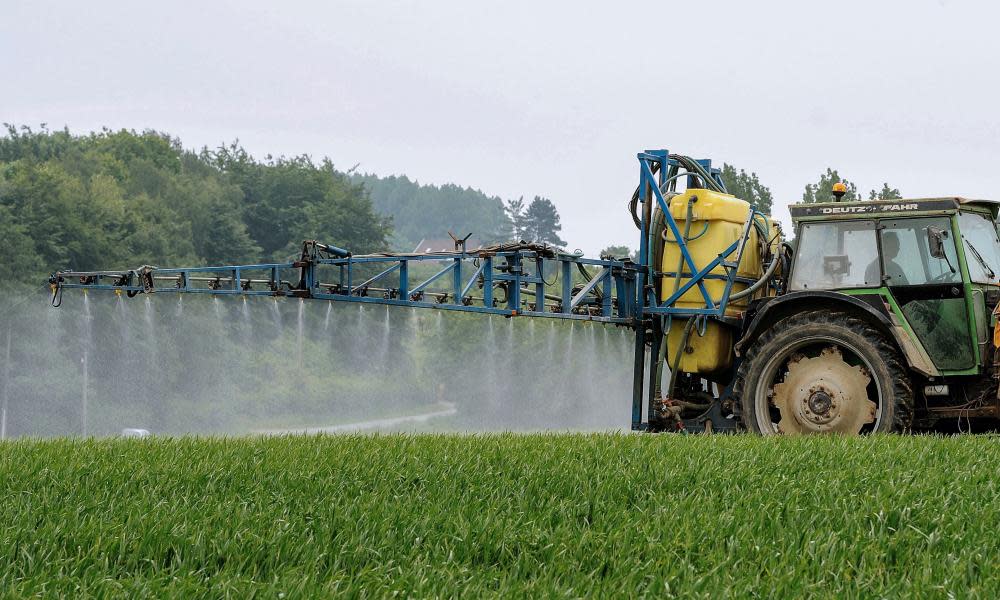Radical change is needed to ensure farms produce healthy food. MPs must act now

A profound ecological transformation of food and farming is achievable, desirable and urgently needed. That’s a message that comes across loud and clear from the RSA Food Farming and Countryside Commission (FFCC) at the culmination of an innovative and independent two-year inquiry.
It provides a clear diagnosis of the causes of the current environmental and health crisis linked to how we produce and consume food. It describes how, over the last 70 years, agriculture has been about specialisation, consolidation and control over nature, with many farmers simply raw material suppliers to a processing industry. This model of agriculture has driven deforestation, wildlife loss, soil degradation and diet-related ill health.
Researchers have uncovered a significant weakening of the pesticide approval process as part of the EU (Withdrawal) Act
We urgently need to farm in harmony with nature and put public and planetary health at the heart of food policy instead – and there’s one particular barrier that we need to do more to overcome: the malign influence of the pesticide industry. It’s no surprise that agrochemical companies are seeking to undermine the transition to environmentally friendly farming – just as the fossil fuel sector has sought to delay and derail the transition to renewable energy. Despite the Green Brexit rhetoric, recent signs are worrying.
In May, researchers from the University of Sussex uncovered a significant weakening of the pesticide approval process as part of the changes under the European Union (Withdrawal) Act 2019, and a risk that the role of scientific evidence in pesticide regulation could be watered down.
A few weeks earlier, leading environmental NGOs resigned from the two main government bodies tasked with reducing environmental harms from pesticide. Citing the alarming decline of wildlife, butterflies and bees and an increase in land treated with pesticides, the Pesticide Action Network explained: “We simply cannot remain members of groups continuing to push the “business as usual” approach as pesticides drive us towards the sixth mass extinction.”
The pesticide industry reach extends beyond Whitehall. Around half of all agronomists – farm advisers – are employed by agrochemical companies . That’s why the recommendation in the FFCC report for every farmer to have access to advisers with “independent and credible knowledge to make substantial changes to their systems or business models” is critical too.
If we liberate our food and farming system from the profit interests of agrochemical companies, what would that look like?
The FFCC report invites us to “imagine instead a future which is about valuing diversity, working with nature, with farmers able to secure their own prosperity and that of future generations.”
It proposes a 10-year transition plan for sustainable, agroecological farming by 2030 – applying the principles of the regenerative economy to agriculture to create a sustainable and fair food system.
Don’t expect the pesticide industry to agree without a fight. There are profits at stake with a shift away from business as usual – although there is space for a just transition too.
Related: ‘Children are being poisoned’: California moms lead the way to pesticide ban
Joined-up thinking is key yet, for instance, the Department of Health is dismissive of its need to be involved in proposals for “less but better” livestock and measures such as a tax on processed meat, when public health should surely be a key part of future food policy decisions.
There are also important question over what would this shift would mean for the cost of food. The UK already has the third-cheapest food among developed countries, yet it also has the highest food insecurity in Europe, too, because political decisions have led to poverty wages and grotesque wealth inequality.
The reality is that we’re all paying an eye-watering price for business as usual – most of all through harm to our precious natural environment and escalating ill health. The notion that we can’t afford sustainable food is also challenged by cities such as Copenhagen, which recently reached a target for 90% organic food in municipal institutions without increasing procurement costs.
Nothing short of a radical transformation of food and farming will suffice. At a time when society faces many divisions, agroecology offers practical hope for averting climate breakdown, restoring nature and securing human health, wellbeing and livelihoods. That’s an approach that many different voices and interests could unite behind. When MPs eventually get the chance to amend the agriculture bill, let’s put agroecology at its very heart.
• Caroline Lucas is the Green MP for Brighton Pavilion

 Yahoo News
Yahoo News 
